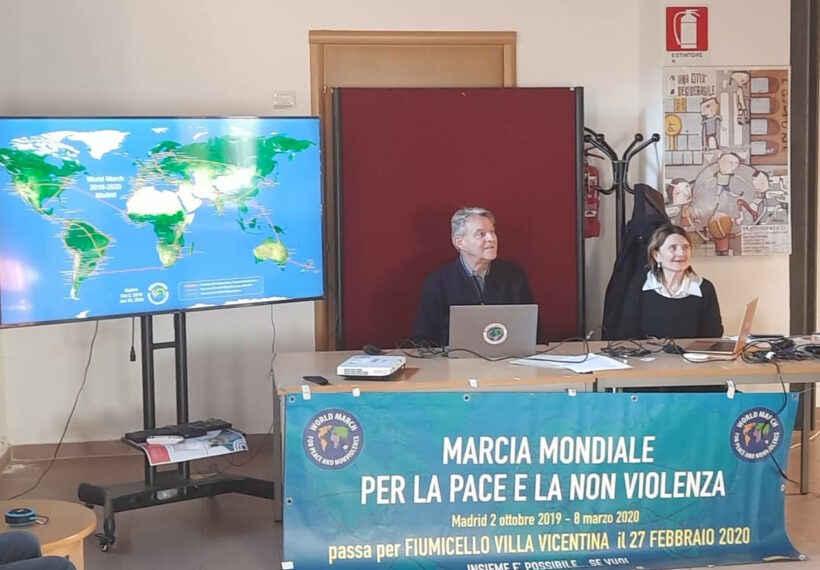The presence of Rafael De La Rubia, promoter of the first two world marches for peace and nonviolence, made it possible to organize a series of meetings in Italy to launch the third world march for peace and nonviolence, scheduled from October 2, 2024 to January 5, 2025, starting and ending in San Jose, Costa Rica.
The first of these meetings took place on Saturday, February 4, in Bologna, at the Centro di Documentazione delle Donne (Women’s documentation center).
Rafael took the opportunity to briefly recall the two occurrences of the march: the first, which started in New Zealand on October 2, 2009 and ended in Punta de Vacas [in Argentina] on January 2, 2010 aggregated more than 2,000 grassroots organizations around the march project.
Given the importance of the themes of peace and nonviolence and the strong symbolic value that the first march immediately acquired, it was envisaged for the second one to change the paradigm and attempt to organize a new march from grassroots activities, without a centralized organization.
The success of the 2018 March for Peace and Nonviolence in Latin America made it possible to verify that this kind of paradigm works, and from that point the project of the second World March for Peace and Nonviolence began: it started in Madrid on October 2, 2019 and ended, again in Madrid, on March 8, 2020.It involved more local organizations than the previous March and lasted several days longer, despite the problems generated, especially in Italy, by the onset of the COVID19 pandemic.
Rafael then gave insights on the way to proceed at the local level in the months leading up to the start of the third march, insights that touched on all levels, from the personal motivation of the activists involved to the social significance of the individual events and the march as a whole.
Each individual involved in the march must feel that he or she is performing a worthwhile action in which his or her feelings, intellect and action converge coherently; this, if repeated for all who participate in the activities, will give the individual activity and consequently the entire march an enthralling and transformative force.
Each action in the march must have the characteristic of an exemplary action; that is, a local action, even a small action, that improves the quality of life in a community.
Specifically, local activities can be the most varied: a particularly effective, fun and symbolic one is the creation of human symbols of peace, which moreover has the advantage of being scalable depending on the number of people one is able to involve.
In this first phase, in Italy, the willingness of local committees is being mobilized: at the moment the committees of Alto Verbano, Bologna, Florence, Fiumicello Villa Vicentina, Genoa, Milan, Puglia [also called Apulia] (with the intention of spreading to the Middle East), Reggio Calabria, Rome, Turin, Trieste, and Varese have joined.






